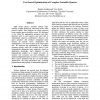Free Online Productivity Tools
i2Speak
i2Symbol
i2OCR
iTex2Img
iWeb2Print
iWeb2Shot
i2Type
iPdf2Split
iPdf2Merge
i2Bopomofo
i2Arabic
i2Style
i2Image
i2PDF
iLatex2Rtf
Sci2ools
122
click to vote
SSDBM
2007
IEEE
2007
IEEE
Cost-based Optimization of Complex Scientific Queries
High energy physics scientists analyze large amounts of data looking for interesting events when particles collide. These analyses are easily expressed using complex queries that filter events. We developed a cost model for aggregation operators and other functions used in such queries and show that it substantially improves performance. However, the query optimizer still produces suboptimal plans because of estimate errors. Furthermore, the optimization is very slow because of the large query size. We improved the optimization by a profiled grouping strategy where the scientific query is first automatically fragmented into subqueries based on application knowledge. Each fragment is then independently profiled on a sample of events to measure real execution cost and cardinality. An optimized fragmented query is shown to execute faster than a query optimized with the cost model alone. Furthermore, the total optimization time, including fragmentation and profiling, is substantially impr...
Related Content
| Added | 04 Jun 2010 |
| Updated | 04 Jun 2010 |
| Type | Conference |
| Year | 2007 |
| Where | SSDBM |
| Authors | Ruslan Fomkin, Tore Risch |
Comments (0)

